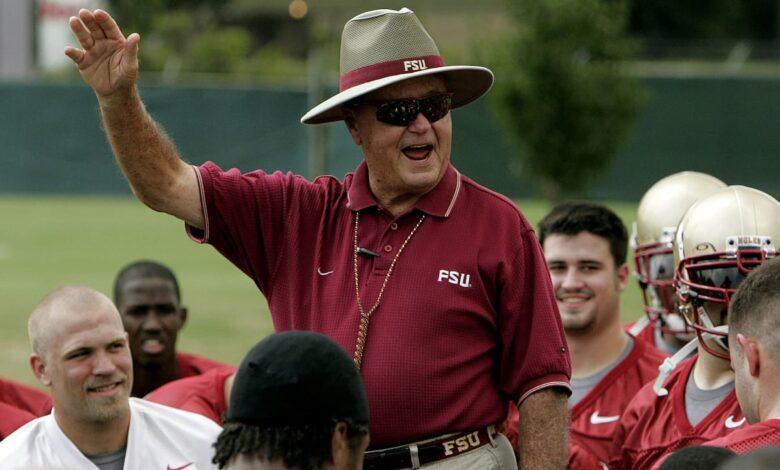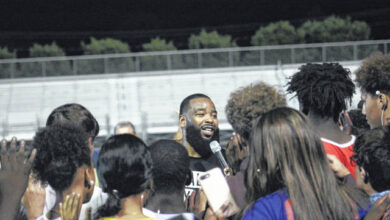With irresistible charm, Bobby Bowden transformed Florida State into an NFL factory

College football lost one of its most legendary coaches on Sunday when Bobby Bowden died at the age of 91, succumbing to a terminal illness he publicly revealed in July. While Bowden didn’t disclose his condition at the time, his son, Terry, said shortly thereafter that the College Football Hall of Famer had been diagnosed with pancreatic cancer.
“I’ve always tried to serve God’s purpose for my life, on and off the field, and I am prepared for what is to come,” Bobby Bowden told the Tallahassee Democrat on July 21. “My wife, Ann, and our family have been life’s greatest blessing. I am at peace.”
Born Robert Cleckler Bowden on Nov. 8, 1929, the Birmingham, Alabama, native rose to prominence as coach at Florida State from 1976 through 2009, winning national championships in 1993 and ’99. The collective impact his players had on the NFL was immense. He coached three eventual Pro Football Hall of Famers (Derrick Brooks, Walter Jones, Deion Sanders), plus a 2021 HOF finalist in LeRoy Butler. FSU produced 31 first-round draft picks under Bowden, including Warrick Dunn, Terrell Buckley, Antonio Cromartie and Sebastian Janikowski. He coached an NFL general manager (Martin Mayhew), an NFL coach (Jets assistant Leon Washington), a Super Bowl-winning quarterback (Brad Johnson) and a long line of Pro Bowlers, including Marion Butts, Peter Boulware, Samari Rolle, Tra Thomas, Corey Simon, Chris Hope, Darnell Dockett and Anquan Boldin.
Known for graciousness, class and affability, Bowden parlayed his fatherly, down-to-earth demeanor into close relationships with coaches, recruits, players, administrators and media alike. He was a disarming storyteller with all the charm of a salesman, but none of the phoniness. He was also a hard-driving coach, to be sure, but one who met heart-wrenching losses with immediate perspective, and swapped in his favorite pejorative — “Dadgum!” — in place of any cursing. He and his wife, Ann, were married for 72 years. Three of their six children went into the coaching profession: Tommy, a 10-year head coach at Clemson; Terry, who led an undefeated Auburn team in 1993 and currently coaches at Louisiana-Monroe; and Jeff, who was an assistant coach at six schools, including offensive coordinator at FSU under his father.
Bowden was a college head coach for 44 years: four at Howard College (now known as Samford University), six at West Virginia from 1970-75, then 34 at Florida State. Bowden never coached in the NFL, even as an assistant, but once acknowledged being courted by the Atlanta Falcons.
While his two national championships came during Florida State’s membership in the Atlantic Coast Conference, Bowden built the program into a national power without the help of conference membership. Long before FSU joined the ACC in 1992, the Seminoles were among college football’s top teams as an independent. Bowden took over a downtrodden Seminoles program in 1976 that had gone 4-29 over the three prior seasons. The Seminoles went 5-6 in Bowden’s first year, marking the only losing season of his 34-year tenure in Tallahassee. Bowden reached back-to-back Orange Bowls in the 1979 and 1980 seasons, his fourth and fifth at FSU.
Bowden sought to build the Seminoles’ national profile by scheduling a heavy share of top-ranked opponents, knowing those games would give his program the recruiting advantage of network television exposure. Some of those opponents wouldn’t sign a traditional, two-year, home-and-home contract with FSU, however, so Bowden agreed to play certain road games without a return home game. Never was his willingness to do so more obvious than in 1981, when the Seminoles played five consecutive road games against Nebraska, Ohio State, Notre Dame, a Dan Marino-led Pitt team and LSU, winning three of them. The ‘Noles finished that season with another road game at archrival Florida. In the 1980s, Bowden combined traditional football concepts with a heavy dose of trick plays, including reverses to WR Jessie “The Jet” Hester and the fabled Puntrooskie against Clemson in 1988. Until Deion came along as an electrifying punt returner, Bowden’s Seminoles also were known for aggressively rushing opposing punters for blocks instead of setting up returns. A year before Sanders’ arrival, the 1984 Seminoles blocked eight punts, returning six for touchdowns.
Source link


